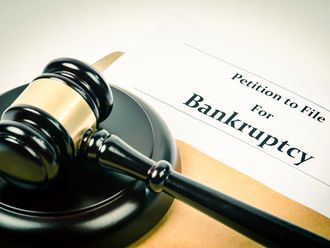Dubai: On their return to Dubai from college in the West, Shaz Sheibani and Shehab Hamad, both 29 now and from Iran and Egypt respectively, missed some of the culture they had grown to love - alternative music, films, art and photography.
Slowly, and on a small scale, they started to recreate them here, organising small parties and launches in old hotels and non-club settings. Besides bringing in international DJs, VJs and musicians and showing foreign independent films, they invited local photographers, artists and urban poets to share their work.
As their efforts grew in popularity, drawing a loyal audience, the duo decided to make it their full-time occupation.
Three years ago, with another partner, 32-year-old Ben McDonald from the UK, they started Kitsch22, adding fashion distribution and retailing along with public relations, graphic design and corporate launches. Starting out with two, the company today has a staff of 20 and a turnover of about Dh2.5 million.
"We started with our personal savings of about Dh200,000 but it evolved gradually. It wasn't sort of 'Okay, let's put aside $100,000 and start a company.' We recreated different cultural happenings, adding one thing after another. It's very competitive out there but we have tried to stay above the water by being creative, by offering something outside the norm."
Many successful small and medium businesses in Dubai have a similar tale to tell. In most cases, they have found a niche or have set themselves apart with quality and service in a niche market.
Starting with their personal funds and loans, owners of businesses have faced challenges of cash flow management and raising funds for further expansion. Other problems include finding an affordable space and getting the right people. "Small businesses that thrive have a plan and stick to it without losing focus or being tempted into quick buck. They manage their cash flow carefully as this is a trap that kills many businesses - growing too quick too soon," says Steve Williams, chief operating officer at Middle East Lloyds TSB Group. He estimates that there are up to 50,000 small businesses in Dubai with less than 50 employees and revenues of not more than Dh25 million.
Forty-three-old British national Mark Allan put up more than Dh100,000 of his personal savings to pay for initial set up costs for Wet Fish Trading. It supplies fresh and chilled fish to five-star hotels and restaurants in Dubai as well as to Emirates Flight Catering.
"Visas for the family, for the staff, trading licence, the bureaucracy - just getting things organised - can take a hell of a long time and it's expensive. And then once you are here, school costs for children don't come cheap. You've got to have enough money for one year to cover what you do personally."
For the warehouse, which has a processing unit, he took out a start-up loan of Dh700,000 from Lloyds TSB Bank. "It's conservative lending when compared to the UK and the cost of borrowing is also a bit higher," Allan says. "But I suppose when you weigh up your outgoings against what you pay in the UK in terms of the income tax, corporation tax, capital gains tax, I would like to think you are positive living and working in Dubai. Otherwise you shouldn't be here."
Today, Wet Fish, with five employees, is doing a business of about Dh7 million. "The profit margins are not fantastic. It's about five per cent to six percent," Allan says.
However, once the business is up and running, "the biggest challenge is cash flow," Allan acknowledges.
He points out that in the UK, where he operated the same business before coming to Dubai in 2004, HSBC offered him invoice discounting, which allowed him to draw money against his invoices. That's very common in the UK, but he says the facility is not available here. "But Lloyds created a bespoke system for me because they recognised that it would be difficult for our cash flow. I have the comfort of drawing against the money that a company would owe me. You are using your own money but just drawing it earlier and the bank is covering the debt. The bank takes a commission, obviously. After all, they are lending you the money," Allan explains. "When you are dealing with clients like the big hotels whose creditworthiness is undoubted, Lloyds is happy to advance the debt book."
For those managing cash flow on their own it can get difficult. "Cash flow management is always an issue," says Sheibani of Kitsch22. "There have been times when we had to dig deep into our pockets. Clients always want to pay late and we had to pay early. As you go along, you learn to negotiate the best credit you can from your suppliers. There has been a lot of trial and error, a lot of learning from our mistakes. There is no readymade formula for it."
For other small businesses, raising funds for expansion can be a challenge.
But Nayla Al Khaja, owner of advertising and public relations firm D-Seven, says, "It's a cliché, but where there's a will there's way."
Al Khaja, a 28-year-old UAE national, put in her savings of Dh 175,000 and today the company has a monthly turnover of Dh 50,000. D-Seven has carved out a niche catering to government agencies and ministries.
With plans to expand D-Seven, which she would like to ultimately turn into a commercial film production company, she is currently in the middle of redesigning her business plan. "What we are trying to do is to get private investors as opposed to getting loans from banks," Al Khaja says.
She disagrees that all private investors are looking for quick returns, especially from the real estate sector.
"I think you can find investors who are artistic as well, who are rich and have flair, who have a lot of ego. You can find someone who likes the glitz and glamour of this industry," she says. "I'm a social butterfly and pretty much connected. So I don't think it's impossible to raise funds."












